九年级英语全册Unit10You’resupposedtoshakehands单元综合检测新版人教新目标版
九年级英语全册 Unit 10 You’re supposed to shake hands Sec
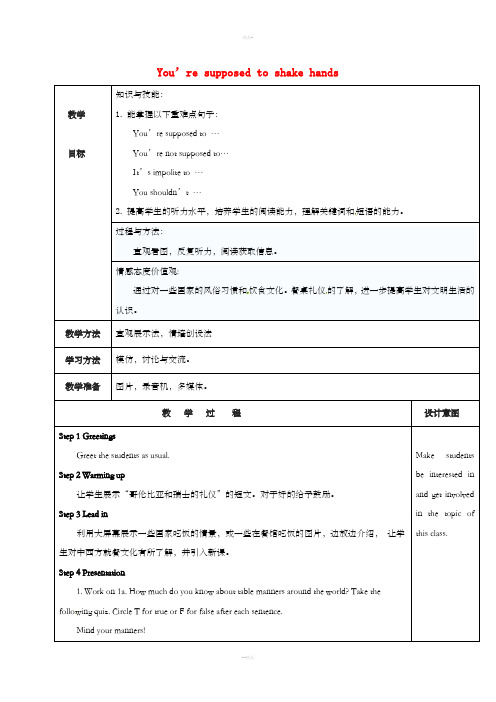
You’re supposed to shake hands教学目标知识与技能:1.能掌握以下重难点句子:You’re supposed to …You’re not supposed to…It’s impolite to …You shouldn’t …2.提高学生的听力水平,培养学生的阅读能力,理解关键词和短语的能力。
过程与方法:直观看图,反复听力,阅读获取信息。
情感态度价值观:通过对一些国家的风俗习惯和饮食文化。
餐桌礼仪的了解,进一步提高学生对文明生活的认识。
教学方法直观展示法,情境创设法学习方法模仿,讨论与交流。
教学准备图片,录音机,多媒体。
教学过程设计意图Step 1 GreetingsGreet the students as usual.Step 2 Warming up让学生展示“哥伦比亚和瑞士的礼仪”的短文。
对于好的给予鼓励。
Step 3 Lead in利用大屏幕展示一些国家吃饭的情景,或一些在餐馆吃饭的图片,边放边介绍,让学生对中西方就餐文化有所了解,并引入新课。
Step 4 Presentation1. Work on 1a. How much do you know about table manners around the world? Take the following quiz. Circle T for true or F for false after each sentence.Mind your manners!Make students be interested in and get involved in the topic of this class.1. In India, you’re supposed to eat with your hands. T F2. In China, you’re not supposed to stick your chopsticks into the food. T F3. In Korea, the youngest person is expected to start eating first. T F4. In France, you’re supposed to put your bread on the table. T F5. In China, it’s impolite to use your chopsticks to hit an empty bowl. T F1)先让学生自己做,老师指导,让他们理解每个句子的意思。
人教版九年级英语全册Unit10You’resupposedtoshakehands
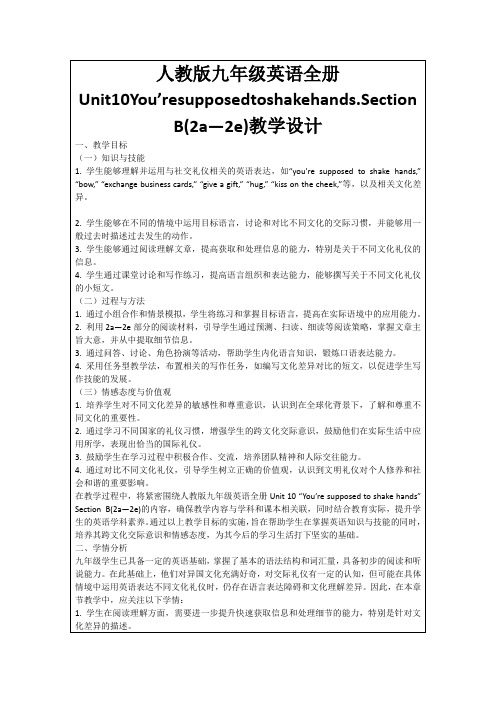
-定期进行总结性评价,检测学生对本章节知识的掌握情况。
四、教学内容与过程
(一)导入新课
为了激发学生对本节课的兴趣,教师将通过以下方式导入新课:
1.利用多媒体展示不同国家的礼仪图片,如握手、鞠躬、交换名片等,让学生观察并猜测这些行为的含义。
2.邀请学生分享他们在生活中遇到的文化差异现象,引导他们思考礼仪在不同文化背景下的重要性。
(三)情感态度与价值观
1.培养学生对不同文化差异的敏感性和尊重意识,认识到在全球化背景下,了解和尊重不同文化的重要性。
2.通过学习不同国家的礼仪习惯,增强学生的跨文化交际意识,鼓励他们在实际生活中应用所学,表现出恰当的国际礼仪。
3.鼓励学生在学习过程中积极合作、交流,培养团队精神和人际交往能力。
4.通过对比不同文化礼仪,引导学生树立正确的价值观,认识到文明礼仪对个人修养和社会和谐的重要影响。
2.撰写一篇关于文化礼仪的小短文,可以选择一个你感兴趣的国家,描述其特有的礼仪习惯,要求运用一般过去时,不少于100词。
3.观看一部与国际文化交流相关的纪录片,记录下至少五个与礼仪相关的场景,并分析其文化背景,下节课与同学分享。
4.家庭作业:与家长一起探讨中国的传统礼仪和现代礼仪,了解它们在生活中的应用,并以图文并茂的形式展示出来。
2.在语言表达方面,学生需要加强一般过去时的运用,以及在实际场景中恰当使用目标语言进行交际。
3.情感态度上,学生可能对某些文化礼仪存在误解,需要引导他们树立正确的价值观,增强跨文化交际意识。
针对以上学情,本章节教学应注重激发学生的兴趣,以实际案例为切入点,引导他们主动参与课堂讨论,提高英语应用能力。同时,关注学生的个体差异,提供个性化指导,帮助他们克服语言障碍,提升文化素养。通过这样的教学策略,使学生在掌握学科知识的同时,培养其国际视野和跨文化交流能力。
人教版九年级全一册英语Unit10重点语法知识点总结
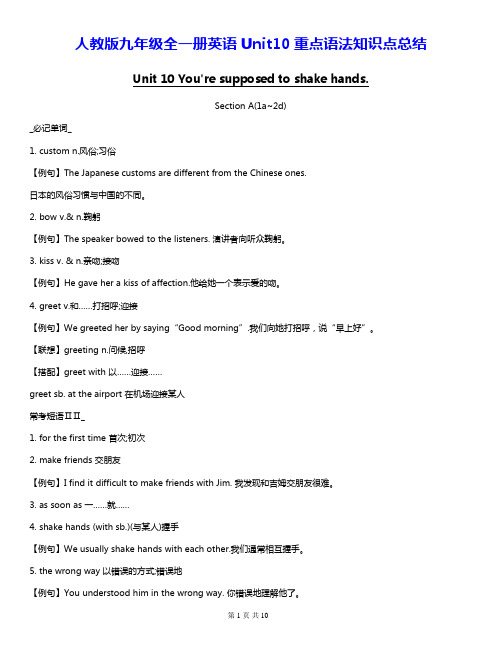
人教版九年级全一册英语Unit10重点语法知识点总结Unit 10 You're supposed to shake hands.Section A(1a~2d)_必记单词_1. custom n.风俗;习俗【例句】The Japanese customs are different from the Chinese ones.日本的风俗习惯与中国的不同。
2. bow v.& n.鞠躬【例句】The speaker bowed to the listeners. 演讲者向听众鞠躬。
3. kiss v. & n.亲吻;接吻【例句】He gave her a kiss of affection.他给她一个表示爱的吻。
4. greet v.和……打招呼;迎接【例句】We greeted her by saying“Good morning”.我们向她打招呼,说“早上好”。
【联想】greeting n.问候,招呼【搭配】greet with 以……迎接……greet sb. at the airport 在机场迎接某人常考短语ⅡⅡ_1. for the first time 首次;初次2. make friends 交朋友【例句】I find it difficult to make friends with Jim. 我发现和吉姆交朋友很难。
3. as soon as 一……就……4. shake hands (with sb.)(与某人)握手【例句】We usually shake hands with each other.我们通常相互握手。
5. the wrong way 以错误的方式;错误地【例句】You understood him in the wrong way. 你错误地理解他了。
6. hold out 伸出(手等)7. greet each other 互相问候8. to one’s surprise 令某人惊讶的是经典句型ⅢⅡ1. That's how people in Japan are expected to greet each other.那就是在日本人们互相问候的方式。
人教版初中英语九年级全册Unit 10 You’re supposed to shake hands

10-(9)了解并跨文化交际(恰当使用)。
四、情感态度
11.乐于参与英语活动,敢于用英语表达,积极与他人合作,体验自己的学习效果。
备教学
重、难点
内容
课标具体知识、技能、文化目标
知识与技能、文化意识的重、难点内容
课标具体策略目标选择
section A
section B
目标1
教学目标5(文化意识目标)
能恰当运用1 What are people in Korea supposed to do?
2when they meet for the first?When were you supposed to arrive?
3 I was supposed to arrive at 7:00.
7.每天课外阅读量最少达到750词。
(四)写
8.能运用…..词汇和…..语言形式以及参照范例(文章结构)简单描述人物或事件等,包括起草和修改。
二、文化意识
9.了解语言和语用的文化因素,体验跨文化交际。
三、学习策略
10-(1)利用读音规则和音标拼读词汇,利用上下文、非语言信息等理解词义,联想学习和记忆词汇,构词法等。
活动二1b
一、活动目标
80%学生能够听懂1b的对话,获取“who”信息;80%学生能够利用预测、语调、重音、问题等来获取听力信息。(达成目标2中的1b目标)
二、活动程序、策略及评价
1.构建听力动场:
布置任务:Listen and check your answers in 1a完成表格,然后自我评价。
80%学生能够利用读音规则和音标拼读词汇,利用语境、非语言信息等理解以上目标要求。
九年级英语Unit10You’resupposedtoshakehands.课文重难点知识点详细讲解[1]解读
![九年级英语Unit10You’resupposedtoshakehands.课文重难点知识点详细讲解[1]解读](https://img.taocdn.com/s3/m/6ec6289ed4d8d15abe234ee6.png)
Unit10 You’re supposed to shake hands.Section A1.In your country, what are you supposed to do when you meet someone for the first time?在你们国家,当你第一次见到某人的时候你应该做什么?【解析】be supposed to do sth 被期望做某事,应该做......1)当主语是人时,表示劝告、建议、责任等,=should =“to be expected to do sth,You are supposed to___________( arrive) on time2)当主语是物时,表示“本应;本该”The train was supposed to arrive half an hour ago.【拓展】:be supposed to 与should(1)be supposed是suppose一词的___________ 语态结构。
后接动词不定式,相当于___________ .后接不定式.即:_______________ . 使用较随便,建议性强否定式为be not supposed to do sth.()To keep safe, drivers aren’t supposed to drink before driving.A. aren’t willing toB. shouldn’tC. aren’t sure toD. don’t have to(2)should后接动词______ ,属于_______ 语态形式,使用起来较严肃和正式;You are not supposed to shake hands. = You shouldn’t shake hands.你不应与之握手。
【2012贵州贵阳】“Henry, you ______ tell the teacher if you want to go out of the classroom.”“Sorry, sir.”A. are supposed toB. are surprised toC. are afraid to【2013山东菏泽】8. You are _____to type quickly when talking to each other on QQ so the other person doesn't get bored A. suggested B. supportedC. taughtD. Supposed【2013黑龙江绥化】29. You are supposed to ________ smoking, ________ you will get ill.A. go on; soB. give up; or C stop; so【2014黔西南州】27. The students ought to wear school uniforms when they’re at school.A. are supposed toB. are allowed toC. would like toD. love to 【2014云南昆明】29. We are supposed to ___________a solution to stop people from looking down at their mobile phones while driving cars.A. come up withB. come formC. come outD. come true 【解析2】for the first time 首先,第一次【辨析】at first/first of all(1) at first = at the beginning 最初,开始【强调在时间顺序或做某事过程等开始之初】(2) first of all 首先,第一【表明陈述事情的重要性】( ) When you want to work for our country in the future, ____, we should have strong body and rich knowledge.A. at firstB. first of allC. for the first timeD. after all【山东德州】We can do a lot to stay healthy. ____ , we should eat a balanced(平衡的) diet.A. At a timeB. In factC. First of allD. All together【有关time的短语】A. firstB. oneC. onceD. firstly【2014贵州六盘水】24. Children always have a good time at the Wetland Park(湿地公园) of Liu Panshui.A. enjoy themselvesB. help each otherC. look beautifulD. have a big dinner()② People in China ________when they meet for the first time.A. bowB. kissC. shake handsD. laugh【新疆】You’re supposed to shake ______ (hand) when you meet your friends.( ) ②—Do you think our football team will win the match? —Yes, we have better players. so I ___them to win.A. hopeB. askC. helpD. expect【2013山东青岛】14. — You look sad. What has happened? —Everyone ______ us to win the match, but we lost.A. expectsB. expectedC. hopesD. Hoped【2013 湖北黄冈】30. Speak slowly, Mr. Wang. I can’t follow you.D. expect希望全班同学参加讨论。
Unit10Youresupposedtoshakehands原文与翻译
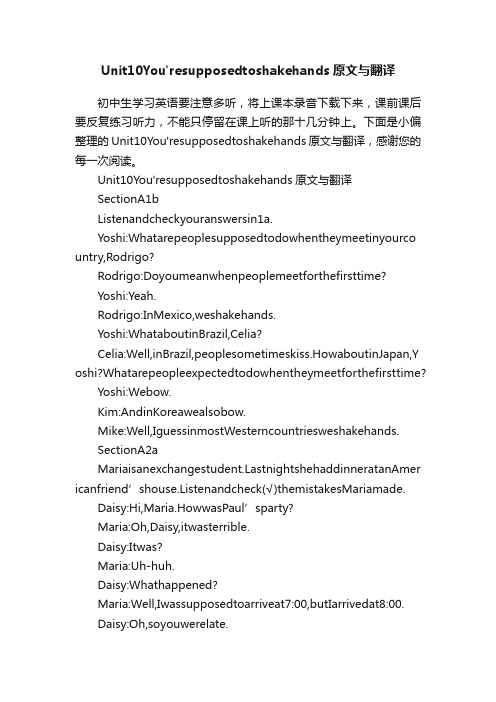
Unit10You'resupposedtoshakehands原文与翻译初中生学习英语要注意多听,将上课本录音下载下来,课前课后要反复练习听力,不能只停留在课上听的那十几分钟上。
下面是小偏整理的Unit10You'resupposedtoshakehands原文与翻译,感谢您的每一次阅读。
Unit10You'resupposedtoshakehands原文与翻译SectionA1bListenandcheckyouranswersin1a.Yoshi:Whatarepeoplesupposedtodowhentheymeetinyourco untry,Rodrigo?Rodrigo:Doyoumeanwhenpeoplemeetforthefirsttime?Yoshi:Yeah.Rodrigo:InMexico,weshakehands.Yoshi:WhataboutinBrazil,Celia?Celia:Well,inBrazil,peoplesometimeskiss.HowaboutinJapan,Y oshi?Whatarepeopleexpectedtodowhentheymeetforthefirsttime?Yoshi:Webow.Kim:AndinKoreawealsobow.Mike:Well,IguessinmostWesterncountriesweshakehands.SectionA2astnightshehaddinneratanAmer icanfriend’shouse.Listenandcheck(√)themistakesMariamade.Daisy:Hi,Maria.HowwasPaul’sparty?Maria:Oh,Daisy,itwasterrible.Daisy:Itwas?Maria:Uh-huh.Daisy:Whathappened?Maria:Well,Iwassupposedtoarriveat7:00,butIarrivedat8:00.Daisy:Oh,soyouwerelate.Maria:Yeah,butinmycountry,it’sdifferent.Whenyou’reinvit edfor7:00,you’reexpectedtocomelater!It’sconsideredstranget oturnupontime.Daisy:Isee.Maria:ThenwhenImetPaul’smom,Ikissedher.Daisy:Oh…youweresupposedtoshakehandsinstead.Maria:That’sright.AndIworeafanc ydress.Daisy:What’swrongwiththat?Maria:Well,itturnedoutthatitwasanoutdoorparty,Daisy.Every oneelsewasinaT-shirtandjeans.Daisy:Iguessnexttimeyoushouldaskwhatyou’resupposedto wear.SectionA2bListenagain.Fillintheblanks.Daisy:Hi,Maria.HowwasPaul’sparty?Maria:Oh,Daisy,itwasterrible.Daisy:Itwas?Maria:Uh-huh.Daisy:Whathappened?Maria:Well,Iwassupposedtoarriveat7:00,butIarrivedat8:00.Daisy:Oh,soyouwerelate.Maria:Yeah,butinmycountry,it’sdifferent.Whenyou’reinvit edfor7:00,you’reexpectedtocomelater!It’sconsi deredstranget oturnupontime.Daisy:Isee.Maria:ThenwhenImetPaul’smom,Ikissedher.Daisy:Oh…youweresupposedtoshakehandsinstead.Maria:That’sright.AndIworeafancydress.Daisy:What’swrongwiththat?Maria:Well,itturnedoutthatitwasanoutdoorparty,Daisy.EveryoneelsewasinaT-shirtandjeans.Daisy:Iguessnexttimeyoushouldaskwhatyou’resupposedto wear.SectionA2dRoleplaytheconversation.Howwasthewelcomepartyforforeignstudentslastnight?Great!Imadesomenewfriends.Butafunnythinghappened.What?ImetaJapaneseboycalledSato,andassoonasIheldoutmyhand, hebowed.That'showpeopleinJapanareexpectedtogreeteachother.It'sim politeifyoudon'tbow.Ididn'tknowthat.SoIjuststoodtherewithmyhandout.Finally,Ire turnedthebow.IrememberwhenlfirstmetMarielastyear,Ididthesamething.Ihe ldoutmyhandandtomysurprise,shekissedmeonbothsidesofmyfac e!Iwouldn'tmindthat!terlfoundoutFrenchpeoplearesupposedtokissw hentheyseeeachother.SectionA3aReadthefollowingopinionsofaColombianandaSwissstudent.I nwhichcountryisitOKtobe15minuteslatefordinner?TeresaLopezCall.ColomblaWhereI’mfrom,we’reprettyrelaxedabouttime.Wedon’tlik etorusharound,sowedon’tmindifpeoplearealittlelatesometimes.Ifyoutellafriendyou’regoingtotheirhousefordinner,it’sOKif youarriveabitlate.Weliketoenjoyourtimeslowly.Wevaluethetimew espendwithourfamilyandfriendsinoureverydaylives.Weoftenjustdropbyourfriendshomesifwehavetime.Wedon’tusuallyhavetomakeplanstomeetourfriends.Whenweseeeachoth er,it’spoliteforboystoshakehandsandforgirlstokisseachotheront hesideoftheface.Weoftenjustwalkaroundthetowncenter,seeingasmanyofourfr iendsaswecan!Marcleblanclausanne.SwitzerlandInSwitzerland,it’sveryimportanttobeontime.We’rethecapi talofclocksandwatches,afterall!Ifsomeoneinvitesyoutomeethimo rheratnoon,thenyou’reexpectedtobethereatnoon.Ifyou’reeven15minuteslate,y ourfriendmaygetmad.SoImake anefforttobeontimewhenImeetmyfriends.Ialwaysleavethehousee arlytoavoidheavytrafficbecauseIthinkit’simpolitetokeepothersw aiting.Also,wenevervisitafriend’shousewithoutcallingfirst.Wealmo stalwaysmakeplanstoseefriends.Weusuallyplantodosomethingin teresting,orgosomewheretogether.SectionB1bSteveisgoingtoChinatostudy.HisfriendYangMingistellinghim aboutthetablemannersinChina.Listenandnumberthepicturesinth eorderyouhearthem.YangMing:YoumustbeexcitedaboutleavingforChinatomorro w,Steve!Steve:Yeah,butI’malittlenervous,too.YangMing:Why?Steve:Well,foronething,Idon’tknowhowtousechopsticksver ywell…andIdon’tknowhowtobehaveatthedinnertable.YangMing:Oh,Isee.Well,oneimportantthingisthatyou’renots upposedtostarteatingfirstifthereareolderpeopleatthetable.Steve:That’sinteresting.IntheUnitedStates,itdoesn’tmatter.YangMing:Yeah,Iknow.It’salsoimpolitetostickyourchopsticksintoyourfood.Youshouldn’tpointatanyonewithyourchopsticks, either.Steve:Oh,OK.YangMing:Oh,andthere’sonemorethingyouneedtoknow.Yo u’renotsupposedtotalkwhenyou’reeatingdinner.Onlyparentsa reexpectedtotalkatthedinnertable.Childrenarenotallowedtospea k.Steve:Wow!That’s…that’sunusual!YangMing:Haha,I’mjustkidding!SectionB1cListenagain.Matchthesesentenceparts.YangMing:YoumustbeexcitedaboutleavingforChinatomorro w,Steve!Steve:Yeah,butI’malittlenervous,too.YangMing:Why?Steve:Well,foronething,Idon’tknowhowtousechopsticksver ywell…andIdon’tknowhowtobehaveatthedinnertable.YangMing:Oh,Isee.Well,oneimportantthingisthatyou’renots upposedtostarteatingfirstifthereareolderpeopleatthetable.Steve:That’sinteresting.IntheUnitedStates,itdoesn’tmatter.YangMing:Yeah,Iknow.It’salsoimpolitetostickyourchopstick sintoyourfood.Youshouldn’tpo intatanyonewithyourchopsticks, either.Steve:Oh,OK.YangMing:Oh,andthere’sonemorethingyouneedtoknow.Yo u’renotsupposedtotalkwhenyou’reeatingdinner.Onlyparentsa reexpectedtotalkatthedinnertable.Childrenarenotallowedtospea k.Steve:Wow!That’s…that’sunusual!Yang Ming:Haha,I’mjustkidding!Readtheletterandanswerthequestions.DearLaura,Thanksforyourmessage.Yes,I’mhavingagreattimeonmystudentexchangeprograminFrance.IwasabitnervousbeforeIar rivedhere,buttherewasnoreasontobe.Myhostfamilyisreallynice.Th eygooutoftheirwaytomakemefeelathome.Thegrandmotherknow sthatImissChinesefoodalot.SosheactuallylearnedhowtomakeChi nesefood!Shealsohasateenagegranddaughteraboutmyagewhois reallykind.ShealwaystalkstomeinFrenchtohelpmepractice.Youwo uldn’tbelievehowquicklymyFrenchhasimprovedbecauseofthat.I’mverycomfortablespeakingFrenchnow.AlthoughIstillmak elotsofmistakes,itdoesn’tworrymeasitusedto.Mybiggestchallengeislearninghowtobehaveatthedinnertabl e.Asyoucanimagine,thingsareverydifferentfromthewaytheyareat home.Forexample,you’renotsupposedtoputyourbreadonyourpl ate.You’resupposedtoputitonthetable!Ithoughtthatwasprettyst rangeatfirst,butnowI’musedtoit.Anotherexampl eisthatyou’renotsupposedtoeatanythingwit hyourhandsexceptbread,notevenfruit.Youhavetocutitupandeatit withafolk.Anotherthingisthatitisimpolitetosayyou’refull.Ifyoudo n’twantanymorefood,youshouldjustsay,“Thatwasdelicious.”Al so,you’renotsupposedtoputyourelbowson thetable.Ihavetosayt hatIfinditdifficulttoremembereverything,butI’mgraduallygettingusedtoit.Idon’tfindFrenchcustoms sostrangeanymore,I’llwriteagainsoonandtellyoumoreaboutmylifeinFrance.Hopeyou’rehavingagoodschoolyear.Yours,LinYue翻译:凯蒂:昨晚为留学生举办的欢迎派对怎么样?约翰:真棒!我交了一些新朋友,不过发生了一件很有趣的事情。
人教版初中英语九年级全册Unit10You’resupposedtoshakehands
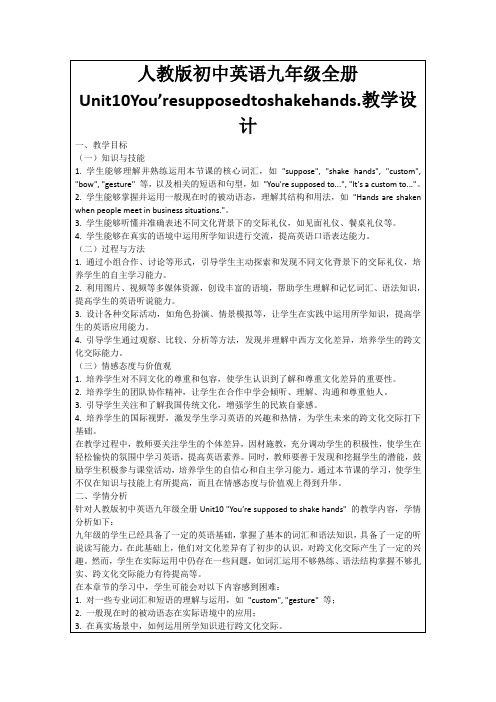
一、教学目标
(一)知识与技能
1.学生能够理解并熟练运用本节课的核心词汇,如"suppose", "shake hands", "custom", "bow", "gesture"等,以及相关的短语和句型,如"You're supposed to...", "It's a custom to..."。
4.教学评价:
-教师采用多元化的评价方式,如课堂表现、作业完成情况、实践活动参与度等;
-学生参与评价,反思自己的学习过程,提高自我监控和自主学习能力;
-教师根据评价结果,调整教学策略,以提Biblioteka 教学质量。四、教学内容与过程
(一)导入新课
在这一环节中,我将通过以下步骤引导学生进入新课的学习:
1.利用多媒体展示不同国家的见面礼仪图片,如中国人握手、日本人鞠躬、西方人拥抱等,激发学生的好奇心。
-一般现在时的被动语态的构成和用法;
-不同文化背景下的交际礼仪知识。
2.难点:
-在实际语境中灵活运用核心词汇和短语;
-准确运用一般现在时的被动语态进行表达;
-理解并尊重不同文化背景下的交际礼仪,进行有效的跨文化交际。
(二)教学设想
1.课前准备:
-教师准备相关的图片、视频等多媒体资源,以便在课堂上创设丰富、真实的语境;
(二)过程与方法
1.通过小组合作、讨论等形式,引导学生主动探索和发现不同文化背景下的交际礼仪,培养学生的自主学习能力。
2.利用图片、视频等多媒体资源,创设丰富的语境,帮助学生理解和记忆词汇、语法知识,提高学生的英语听说能力。
Unit10You'resupposedtoshakehands.知识梳理人教版英语九年级全册

Unit 10 You're supposed to shake hands.短语归纳1.首次;初次____________________2.(与某人)握手___________________3.……怎么样/如何____________________4.以错误的方式;错误地____________5.一……就……____________________6.伸出(手等)________________________________________ 8.发现;找出;查明_________________ ____________________ 10.顺便拜访;顺便进入_____________11.在……的两边____________________ 12.在某人的日常生活中_____________ 13.尽可能……____________________ 14.准时,按时____________________ 15.……的首都/国都____________________ 16.在中午____________________ 17.大动肝火;气愤____________________ 18.有趣的事情________________________________________ 20把……擦掉____________________21.脱下(衣服);(飞机等)起飞________________22.餐桌礼仪____________________ 23.把……插入……____________________ 24.指着____________________指向____________________ 指出____________________25.因……而感谢____________________ 因……而感谢某人____________________26.玩得高兴,过得愉快_________________ 27.使(某人)感到宾至如归______________________________ 29.因为;由于____________________30.最初;首先____________________ (反:最后;终于____________________)____________________ 32.像____________________ 33.出席;露面____________________ ____________________35.毕竟;终归________________________________________38.和……不同____________________ (反:和……相同____________________)____________________40.对……感到放松/随意___________________Section A风俗习惯1)custom〔名词〕风俗;习俗The customs are different from country to country.I don't like the custom of giving presents in that country.The Japanese customs are different from the Chinese ones.Nailbiting is one of her bad habits.2.bow 鞠躬bow①〔不及物动词〕鞠躬bow to/before...向……鞠躬The speaker bowed to/before the listeners.②〔及物动词〕低(头)She bowed her head.③〔名词〕鞠躬(读作/bau/);弓(读作/bəu/)The Japanese usually take a bow while greeting.He made his son a bow.3.shake hands 握手shake hands 握手其中shake(shook,shaken) 既可用作及物动词,也可用作不及物动词,意为“摇动;抖动”。
- 1、下载文档前请自行甄别文档内容的完整性,平台不提供额外的编辑、内容补充、找答案等附加服务。
- 2、"仅部分预览"的文档,不可在线预览部分如存在完整性等问题,可反馈申请退款(可完整预览的文档不适用该条件!)。
- 3、如文档侵犯您的权益,请联系客服反馈,我们会尽快为您处理(人工客服工作时间:9:00-18:30)。
Unit 10 You're supposed to shake hands.满分:100分,限时:60分钟Ⅰ.单项选择(每小题1分,共15分)1.As for the problem, I don't agree you. My idea is different yours.A.with;asB.with;fromC.to;asD.to;from答案 B 本题考查介词的搭配。
agree with sb.意为“同意某人的意见或看法”;be dif ferent from...意为“和……不同”,故答案为B。
2.Why not read the novel?I think it is worth .A.readB.to readC.readsD.reading答案 D sth.be worth doing是固定搭配,意为“某事值得被做”。
故答案为D。
3. Last Sunday my whole family went to the beach my father. He was away on business.A.fromB.exceptC.withD.including答案 B 根据题干中的“他出差了”可推断,除了我爸爸没有去,我们全家都去海滩了,故所缺的词是except。
4.I'm not sure,but he's supposed sometime next week.A.returnB.returnsC.to returnD.returning答案 C “应该做某事”表示为be supposed to do sth.。
5.The box is . There is nothing in it.rgeB.fullC.emptyD.heavy答案 C 题干中提到了“里面什么都没有”,由此可知,这个箱子是“空的”,故empty符合题意。
6.—I'm sorry to keep you long.—That's all right.A.waitB.waitingC.waitedD.to wait答案 B 根据keep sb. doing sth.“使某人一直做某事”的固定搭配可知答案为B。
7.I'm always before the exam. I often try to make myself calm down by taking a deep breath.A.relaxedB.boredC.nervousD.happy答案 C 根据本题语境可知,我在考试之前总是很“紧张”,我经常通过深呼吸的方式让自己镇静下来,故所缺的词是nervous。
8.She used up late, but now she is used to up early.A.get;getB.to get;gettingC.to get;getD.get;getting答案 B 根据used to do sth.和be used to doing sth.的搭配可知答案为B。
9.What a nice day! You should go sightseeing watching TV at home.A.because ofB.instead ofC.together withD.out of答案 B 根据本题语境可知,你们应该去观光,而不是待在家里看电视,故instead of符合题意。
10.When you are swimming, your ears. You can use earplugs to stop water getting into your ears.A.take afterB.take part inC.take offD.take care of答案 D 本题考查take短语。
四个选项的含义分别是:take after长得像;take part in参加;take off脱掉,起飞;take care of照顾。
结合本题语境可知,在游泳的时候,要照顾好你的耳朵,你可以使用耳塞以防水进入到你的耳朵里,故答案为D。
11.—I am going to spend my summer holiday in Hawaii.—A.Have a good time!B.Good luck!C.Can I go with you?D.Good idea!答案 A 题干中提到了“我打算去夏威夷度暑假”,由此可推断,正确的答语是A,该项的含义是“祝你玩得开心!”。
12.The two companies decided to work together they had common interest.A.becauseB.unlessC.butD.or答案 A 本题考查连词的用法。
句意:那两家公司决定合作,因为他们有共同的利益。
由此可知所缺的词是because。
13.—Excuse me. Could you please tell me my car?—Sure. Park it right here.A.how to stopB.where to washC.where to parkD.when to park答案 C 结合答语中的“就停在这里吧”可推断,问句问的是“请问你能告诉我把车停在哪里吗”,故where to park符合题意。
14.Jack doesn't tell me when he . I will call you as soon as he .A.will come;comesB.will come;will comees;will comees;comes答案 A 句意:杰克没有告诉我他什么时候来。
他一来我就会给你打电话。
第一句含有宾语从句,根据语境可知从句要用一般将来时;第二句含有时间状语从句,主句是一般将来时,从句要用一般现在时,故答案为A。
15.—Excuse me.Could you tell me about the local history and culture?—Of course. You can check it on this computer.A.how can I get the informationB.what information did I getC.where I can get the informationD.that I got the information答案 C 宾语从句要用陈述句语序,先排除A和B;结合答语中的“你可以在这台电脑上查阅一下”可推断,问句问的是“你能告诉我在哪里可以获得关于当地的历史和文化方面的信息吗”,故答案为C。
Ⅱ.完形填空(每小题2分,共30分)My name is Philippe and my wife's name is Sophie. We're from 16 . Recently we were faced witha 17 situation while traveling by car in the mountains with our hired driver. Just as we began todoze(打盹), the car made a strange, loud noise and then 18 working.We tried communicating with the driver but with little 19 , because he couldn't speak French.He tried to tell us with body language that he was going to get help and then he left.We were in a poor area, with 20 houses in sight. We started to hear the cries of wild animals.Sophie was very afraid. We didn't have much food and it was getting 21 and darker. I began to lose22 . Should we leave the car?Would our driver ever 23 ?Was h e a trustworthy man?We were very worried.A couple of hours passed. 24 , the headlights from another car appeared in the dark. A man gotout of the car. Finding us cold and hungry, he kindly asked us to 25 his car.26 we left, he put a note on the windshield of the car with his phone number on it. Then he droveus to a nearby village, and we met his family. His cousin spoke French and he 27 us tea and local foods. 28 asked us questions and they were excited to have unexpected guests.Later that evening, the phone rang. It was our 29 . He had kept his word and fixed the car.I will 30 forget the warmth we received on that day because we depended on a complete strangerfor help.16.A.America B.Germany C.France D.Brazil17.A.difficult B.suitable C.pleasant D.hopeful18.A.started B.stopped C.continued D.finished19.A.suspect B.advice C.magic D.success20.A.no B.some C.several D.many21.A.colder B.warmer C.heavier D.lighter22.A.memory B.way C.confidence D.interest23.A.leave B.return C.drive D.wait24.A.Suddenly B.Sadly C.Exactly D.Safely25.A.get to B.get on C.get off D.get into26.A.Whenever B.After C.Before D.Until27.A.donated B.offered C.sold D.lent28.A.Someone B.No one C.Everyone D.Anyone29.A.farmer B.waiter C.doctor D.driver30.A.almost B.sometimes ually D.never答案[语篇解读] 本文讲的是来自法国的Philippe和他的妻子Sophie在外国旅游时的经历。
